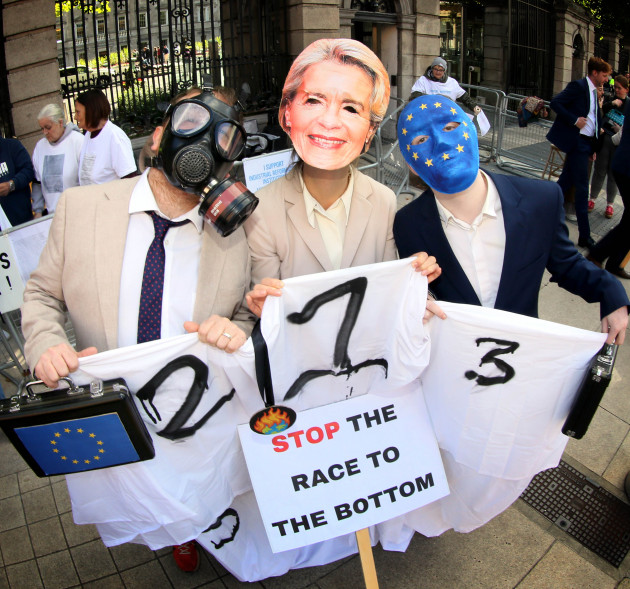THE EU IS making moves that would trample on hard-fought protections meant to prevent catastrophic workplace tragedies and environmental abuses. Ireland should stand up against that effort.
Activists across Europe from Brussels to Dublin took to the streets last week to demand greater regulation of bad behaviour by big corporations.
The protests were a response to an attempt by the EU to gut protections meant to ensure that disasters like the collapse of Rana Plaza in Bangladesh 12 years ago – which killed more than 1,100 garment workers, mostly women who were sewing clothes for some of Europe’s biggest brands – never happens again.
The international outcry after the Rana Plaza disaster sparked reforms, most notably France’s 2017 “duty of vigilance” law, which for the first time imposed legal obligations on French-based companies to prevent human rights and environmental abuses throughout their global supply chains.
This duty of vigilance law requires large multinationals to publicly disclose and act on risks in their operations across their value chains globally.
France’s leadership spurred momentum across Europe, culminating in the EU’s Corporate Sustainability Due Diligence Directive (CSDDD) which is designed to compel companies to identify, prevent, mitigate, and remedy human rights and climate harms across their entire value chains.
It requires accountability through civil liability, involvement of stakeholders, and yearly monitoring.
While the directive is not without its faults, most notably the exclusion of the financial sector, it still holds the potential to deliver tangible protections for millions of women working in global supply chains, from garment factories to farms to mines.
It was a hard-won achievement, the result of years of sustained pressure from trade unions, NGOs, women’s rights organisations, and environmental groups across Europe and the world.
The directive faced intense resistance from corporate actors and member states and only passed after months of deadlock and political brinkmanship.
But that hard-won progress is under serious threat from an EU “Omnibus” proposal unveiled last February that would eliminate the protections meant to ensure what happened in Rana Plaza never happens again.
Stripping out protections
Driven by intense corporate lobbying, the Omnibus proposal strips the CSDDD of its core protections. It limits due diligence requirements to a company’s direct, first-tier suppliers, ignoring the deeper layers of subcontracting where the worst abuses, particularly against women, frequently occur.
It weakens stakeholder involvement by narrowing who must be consulted, effectively sidelining already marginalised voices. Critically, it significantly curtails civil liability, meaning victims would have limited legal routes to hold companies accountable, and it blocks trade unions and NGOs from representing them in court.
It also waters down climate obligations by making climate transition plans optional, undermining efforts to address the environmental harm that disproportionately affects communities in the Global South.
This is not about reducing red tape. It is a slash and burn of protections.
One of the most glaring weaknesses in the original CSDDD was the exclusion of the financial sector. While banks, insurers and investment firms were not required to conduct due diligence on activities such as loans, investments, and insurance, a review clause offered a chance to revisit this gap in two years’ time.
The Omnibus proposal would scrap that clause entirely, locking in the exemption and eliminating any future prospect of aligning financial flows with the EU’s human rights obligations or the goals of the Paris Agreement.
This rollback is particularly dangerous in light of new research from ActionAid and Trócaire that exposed the staggering scale of harmful finance coming from the financial sector in Ireland. As of June 2024, Irish-based subsidiaries of investment companies held €31.76 billion ($34 billion) in fossil fuel investments.
Much of this has been shielded from scrutiny thanks to unprecedented lobbying from the financial industry. BlackRock, one of the major investors through Ireland of fossil fuel, despite its public sustainability pledges, is among the most active and influential players pushing to weaken regulation. The Omnibus, if passed, would ensure such actors remain beyond the reach of meaningful accountability.
Pushing back
While corporate lobbyists continue to push their agenda in Brussels, people mobilised across Europe and Ireland to push back. In Brussels thousands marched to demand that Europe strengthen, not weaken, protections for people and the planet.
And outside Leinster House civil society groups, trade unions, and NGOs challenged the “deregulation” agenda that is becoming more and more prominent in Irish economic policy.
This law will translate into real impacts for women globally. In Bangladesh, for example, research shows 80% of female garment workers in Dhaka have witnessed or experienced gender-based violence. With due diligence limited to first-tier suppliers, deeper subcontracting where such abuses thriv will escape oversight.
Companies prominent in Ireland like Primark, Nike, and H&M have already been implicated in serious corporate abuse, including wage theft in factories across Bangladesh, Cambodia, and Indonesia, where workers were underpaid during the Covid-19 pandemic.
Without legislation with teeth, corporate profit will comes first and women’s rights, climate change, human rights will all suffer.
The Irish government is sending mixed signals on this issue. Ministers have publicly declared their support for the CSDDD. Yet they also express backing for the Omnibus proposal that would effectively gut it. This contradiction is reflected in recent policy developments in Ireland. The government just launched the “Action Plan on Competitiveness and Productivity” which frames deregulation and so-called “red tape cutting” as essential to Ireland’s growth.
Decisions made in Brussels and backed in Leinster House have direct consequences for the women stitching our clothes, farming our food, or extracting the minerals in our phones. They are the ones who will be left more vulnerable if corporate accountability is gutted.
The Irish government must reject the Omnibus rollbacks and defend the core of the CSDDD. Ireland must also look beyond Brussels and introduce a strong, gender-responsive national due diligence law that holds Irish companies and investors accountable for their impact on people and the planet. This must include financial services within Ireland’s foreign direct investment.
We owe it to the women who died in Rana Plaza and to the millions still working in similar conditions not to let history repeat itself. Anything less is prioritising profit over people, and silence over justice.
Cillian Quinn is Policy and Programme Manager with ActionAid Ireland who works to end gender-based violence and promote equality in over 71 countries around the world.









